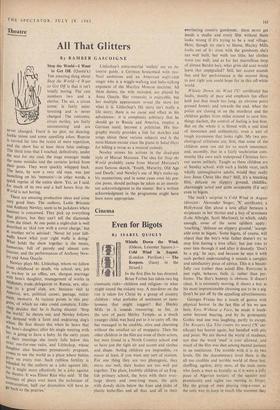The Same Mistake
By PETER FORSTER
ONE characteristic of the Bour- bon Broadcasting Corporation is that it neither learns nor for- gets. Surely their experience with Sid Caesar had taught the BBC the dangers of over- boosting an American comic in advance—but here were Muir and Norden, highly intelligent men, coming for- ward (presumably with the concurrence of other intelligent men like Eric Maschwitz) to make the same mistake all over again, praising Mort Sahl in a way to bury him before he could begin.
In the event Sahl gave us forty-five minutes which, cut to ten, might have made him seem a pleasingly astringent newcomer of the kind Granada used to slip into their old Chelsea at Nine. The message, the mesmerism and the mastery of technique of which we had heard so much escaped me:• as the Times pointed out, many of his jokes could have come straight from a Bob Hope script. They were none the worse for that—and in passing let me insist that there is nothing in- trinsically virtuous about a comic writing all his own material. In the old music-halls and in some cabaret today, the same act can be travelled for years in the knowledge that each new audience will find it fresh. Nation-wide radio and TV nullified this, and since nobody can think up a new act every week with consistent success, the gag-writers are inevitable. I don't care if it was Hope or his writers who recently coined, 'The advantage of Russian science is that their Ger- mans are better than our Germans,' but it is at least as witty as Mr. 5ahl's self-made quips.
As for his alleged novelty, he seems to me plainly in the Will Rogers tradition of comment on the day's newspaper, and though it is pleasant to think of tough American cabaret audiences shriving their guilt-complexes at his altar ('my people,' he calls them, 'my people'), I cannot help suspecting he is no less symptomatic of the general shortage of new comic talent on both sides of the Atlantic.
The first two efforts in Granada's new series The Younger Generation so disappointed me that I refrained from doing as the producer asked in a letter and writing about them. How- ever, last Friday's episode, Our Ted, by Roger Smith, confirmed a feeling that it is all too like pretentiously tarted-up versions of scripts re- jected by ABC's Armchair Theatre. An unneces- sary, button-holing, carefully working-class young narrator; a long opening scene between hard-worked Mum and bored, irresponsible, pimple-squeezing teenage son, which was like a parody of realism done at dictation speed; over to the cafd and teenage low jinks; son takes job as labourer, but is laid off, whereupon he gets grudge against coloured labourer who might have been laid off instead. Finally, for ten minutes or so we had a spot of something like drama in a scene showing the lad being won over to race-prejudice at a meeting ad- dressed by a Mosley-type Fascist.
The old definition of drama as character in action is not a bad one, but movement round the screen is not action, and there is more to establishing character than accurately setting down rhyming slang. The production did every- thing possible to offset the slow, slow tedium.
It remains only to note that on Sunday the BBC so far forgot its new policy that Sunday Night shall be Bright and Light and Trite as to put out a tribute to Hemingway which was ad- mirably conceived and excellently, produced.
Art


































 Previous page
Previous page